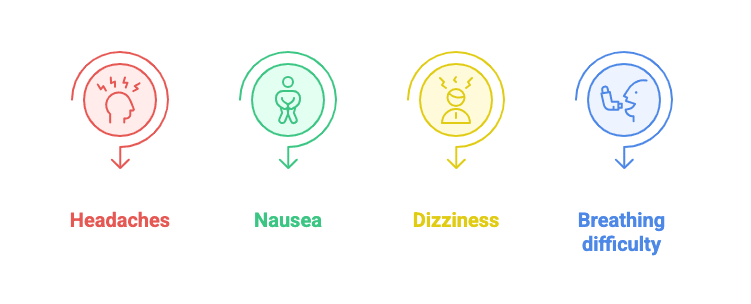Common Causes, Safety Risks, and What That Smell Might Mean
Have you ever walked into your home and noticed a sharp, chemical smell—almost like gasoline?
You pause.
There’s no gas can in sight. No obvious spill. Yet the odor feels real—and unsettling.
If you’re asking yourself, “Why does my house smell like gasoline?”, you’re not alone. Many homeowners notice gasoline-like smells even when no fuel is stored indoors.
What matters most is this:
Not all gasoline-like smells indicate the same level of danger — some are temporary, while others require immediate attention.
In most homes, they fall into one of three situations—from temporary odors to serious safety risks.
This guide helps you understand where that smell might be coming from, how serious it could be, and what factors determine whether action is urgent or not.
Why Am I Smelling Gasoline in My House?
Even if you don’t store fuel indoors, gasoline-like odors can originate from several hidden or unexpected sources.
Most cases fall into three broad categories: stored chemicals, equipment-related fumes, or vapors migrating from nearby spaces.
Common sources include:
- Stored gasoline or chemical solvents
Gasoline cans, paint thinners, or solvents stored in garages or basements can release fumes—especially if containers aren’t sealed properly. - Leaky generators or heating equipment
Some portable generators or fuel-powered heaters may emit vapors even when not in use. - Garage or basement fumes seeping inside
In attached garages or shared foundations, fuel vapors can travel through cracks, door gaps, or ventilation systems. - Underground fuel tanks or buried pipelines
Older homes may still have abandoned tanks that slowly release vapors into surrounding soil and foundations. - Sewer gas mistaken for gasoline
Certain sewer odors can resemble fuel smells. While different in origin, they still signal a ventilation or plumbing issue that shouldn’t be ignored.
Is the Gasoline Smell in House Dangerous?
Potentially—yes. Gasoline vapors are toxic and highly flammable, especially with prolonged exposure or high concentrations.
According to the CDC , gasoline exposure may cause headaches, dizziness, respiratory irritation, and nervous system effects.
The NFPA also warns that gasoline vapors can ignite from everyday household sources, including electrical switches or appliances.
However, the level of danger depends on three key factors:
- Source (stored fuel vs. leaking equipment vs. external migration)
- Concentration of vapors
- Duration of exposure
Short-term symptoms may include eye irritation, nausea, or dizziness.
Long-term exposure—especially for children, elderly individuals, or pets—can be more serious.

If the smell is strong, persistent, or accompanied by physical symptoms, treat it as a potential emergency.
Ventilate the area, avoid sparks, and seek professional help.
In short, risk depends less on the smell itself and more on where it comes from, how strong it is, and how long it lasts.
Gasoline Smell or Natural Gas Leak? Here's How to Tell
If you’ve ever typed why does my house smell like gasoline into Google, make sure you’re not confusing it with a natural gas leak.
Many homeowners confuse the smell of gasoline with natural gas. But they smell and originate very differently:
| Type | Smell | Source |
|---|---|---|
| Gasoline | Sharp, sweet, chemical-like | Car fuel, solvents, generators |
| Natural Gas | Rotten egg (sulfur added) | Utility gas for stove, HVAC, etc. |
What many homeowners do next
When it’s unclear whether a smell comes from gasoline, natural gas, or another source, many homeowners take a practical two-step approach.
1) Address obvious and immediate causes
This may include checking stored chemicals, ventilating enclosed spaces, or contacting a professional if equipment or piping is involved.
2) Add a basic monitoring layer for peace of mind
When odors are intermittent or occur at night, some homeowners choose to add a simple gas monitoring device as an extra safety layer.
This type of device doesn’t replace professional inspection, but it can help by:
- Monitoring gas presence continuously
- Alerting occupants locally or remotely if levels rise
- Providing early warning before a situation becomes urgent
If you want to see what this type of monitoring looks like in practice, here is one commonly used example:
→ GasNet-S4 Wi-Fi Natural Gas Detector
Understanding the difference is often the first step in assessing risk.
If there’s still uncertainty after comparing smells, reviewing a broader Gas Smell Safety Guide can help rule out explosive or utility gas risks before assuming the odor is harmless.
If you’re unsure, reviewing safety guidance from the Environmental Protection Agency or your local gas utility can help clarify what to look for.
What If My House Smells Like Gasoline But I Have No Gas Appliances?
Even all-electric homes can experience gasoline-like odors.
Common culprits include old paint cans, cleaning chemicals, or stored fuels in garages or basements. These materials release volatile organic compounds (VOCs) that can spread through ventilation systems.
In these cases, the challenge isn’t just identifying the smell—it’s understanding whether it’s a one-time odor or a recurring indoor air issue.
How Serious Is the Situation?
A Simple Way to Think About It
Most gasoline-like smell cases fall into one of these categories:
- Temporary & identifiable
A recent spill or open container that resolves after ventilation. - Recurring but unexplained
Odors that return periodically without a clear source. - Strong, persistent, or symptomatic
Smells accompanied by dizziness, headaches, or physical discomfort.
If your situation falls into the second or third category, ongoing monitoring and professional evaluation become more important than one-time ventilation.
Knowing which category applies helps determine whether basic ventilation is enough—or whether further evaluation is necessary.
Not Sure What the Next Step Should Be?
If you can clearly identify and remove the source, the issue may be temporary.
If the smell persists, returns, or can’t be explained, the next step is understanding how different gas-related odors translate into different risk levels — not just one-time fixes.
To see how homeowners evaluate gas smell warning signs and decide what actions to take, refer to our Gas Smell Safety Guide.
FAQ: Gasoline Smells in the House
Why does my house smell like gasoline?
A gasoline smell in your home can come from spilled fuel, leaky tools or equipment, exhaust fumes from an attached garage, or stored chemicals like paint thinners and solvents that release vapors. Even if you don’t store fuel inside, fumes can drift in through vents or cracks in the foundation.
Is a gasoline smell in the house dangerous?
Yes. Gasoline vapors are highly flammable and can ignite from a spark or light switch. Breathing these fumes can also cause headaches, dizziness, and nausea. If you notice a strong smell, ventilate the house right away, avoid using electrical devices, and call a professional if the odor doesn’t fade quickly.
Why does my house smell like gasoline if I have electric appliances?
Even all-electric homes can develop gasoline-like odors. Common sources include:
- Stored chemicals: paint thinners, adhesives, or solvents in the garage or basement.
- Car residue: gasoline on shoes or clothes brought in from the garage.
- Neighbor’s fumes: exhaust drifting through shared walls or vents.
- VOCs: new furniture, flooring, or construction materials releasing chemical odors.
- HVAC intake: drawing in outdoor air from near a gas station or busy road.
Check and seal all storage containers, ventilate regularly, and keep the garage door slightly open when running vehicles or power tools.
What should I do if my house smells like gasoline?
Act fast:
1. Open windows and doors to let in fresh air.
2. Avoid turning on lights, stoves, or electrical switches.
3. Inspect your garage, basement, and storage areas for leaks or open fuel cans.
4. If the smell remains strong, evacuate and call local emergency or utility services.
Some homeowners also choose to use gas monitoring devices to receive early alerts if unusual vapors return, especially in garages or basements.
How can I prevent gasoline smells in the future?
- Store fuel, paint, and cleaning products in sealed containers.
- Keep garages and basements well-ventilated.
- Avoid running engines or power tools in enclosed spaces.
- Place a Wi-Fi gas detector in the garage or basement for continuous monitoring.
Taking small steps now can protect your home from both fire risks and long-term health effects.

Conclusion: Don’t Ignore the Smell
If you’ve ever wondered, “Why does my house smell like gasoline?”, don’t brush it off.
Gasoline-like odors can signal anything from minor storage issues to serious safety risks.
The key is understanding what kind of situation you’re in—and how urgent it really is.
Being informed is the first step toward protecting your home and everyone in it.


